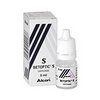BUY BETOPTIC NOW!

INDICATIONS
Betoptic is a beta-blocker that reduces pressure inside the eye. It is used to treat open-angle glaucoma and other causes of high pressure inside the eye.
INSTRUCTIONS
Use betaxolol ophthalmic exactly as it was prescribed for you. Do not use the medication in larger amounts, or use it for longer than recommended by your doctor. Follow the instructions on your prescription label.
Wash your hands before using the eye drops. Do not use this medication while you are wearing contact lenses. Betaxolol ophthalmic may contain a preservative that can be absorbed by soft contact lenses. Wait at least 15 minutes after using betaxolol before putting your contact lenses in.
To apply the eye drops:
- Tilt your head back slightly and pull down your lower eyelid. Hold the dropper above the eye with the dropper tip down. Look up and away from the dropper as you squeeze out a drop, then close your eye.
- Gently press your finger to the inside corner of the eye (near your nose) for about 1 minute to keep the liquid from draining into your tear duct. If you use more than one drop in the same eye, wait about 5 minutes before putting in the next drop.
- Do not allow the dropper tip to touch any surface, including the eyes or hands. If the dropper becomes contaminated it could cause an infection in your eye, which can lead to vision loss or serious damage to the eye.
If you miss a dose - use the medication as soon as you remember. If it is almost time for the next dose, skip the missed dose and use the medicine at the next regularly scheduled time. Do not use extra medicine to make up the missed dose.
DOSAGE
Instill one drop of BETOPTIC S Ophthalmic Suspension 0.5% in the affected eye twice daily. It may be used alone or in combination with other intraocular pressure lowering medications.
STORAGE
Store upright at 2°- 25°C (36°- 77°F). Shake well before using.
Store upright at 2
Do not use this medication if you are allergic to betaxolol, or if you have:
- asthma, or severe chronic obstructive pulmonary disease (COPD);
- slow heartbeats; or
- a heart condition called "AV block."
If you have any of these other conditions, you may need a dose adjustment or special tests to safely use this medication:
- breathing problems such as bronchitis or emphysema;
- a history of heart disease or congestive heart failure;
- diabetes;
- history of stroke, blood clot, or circulation problems;
- a thyroid disorder; or
- a muscle disorder such as myasthenia gravis.
FDA pregnancy category C. It is not known whether betaxolol ophthalmic is harmful to an unborn baby. Before using this medication, tell your doctor if you are pregnant or plan to become pregnant during treatment. It is not known whether betaxolol passes into breast milk or if it could harm a nursing baby. Do not use this medication without telling your doctor if you are breast-feeding a baby.
Do not allow the dropper to touch any surface, including the eyes or hands. If the dropper becomes contaminated it could cause an infection in your eye, which can lead to vision loss or serious damage to the eye.
Betaxolol ophthalmic is sometimes given together with other eye medications. Do not use any other eye medication unless your doctor has prescribed it for you. If you use another eye medication, use it at least 10 minutes before or after using betaxolol ophthalmic. Do not use the medications at the same time.
Betaxolol ophthalmic can cause blurred vision. Be careful if you drive or do anything that requires you to be able to see clearly. Do not use this medication while you are wearing contact lenses. Betaxolol ophthalmic may contain a preservative that can be absorbed by soft contact lenses. Wait at least 15 minutes after using betaxolol before putting your contact lenses in.
Get emergency medical help if you have any of these signs of an allergic reaction: hives; difficulty breathing; swelling of your face, lips, tongue, or throat. Stop using this medication and call your doctor at once if you have any of these serious side effects:
- severe swelling, itching, burning, redness, pain, or discomfort in or around your eye;
- drainage, crusting, or oozing of your eyes or eyelids;
- bronchospasm (wheezing, chest tightness, trouble breathing);
- slow heart rate, weak pulse, fainting, slow breathing (breathing may stop);
- feeling short of breath, even with mild exertion; or
- swelling, rapid weight gain.
Less serious side effects may include:
- mild burning, stinging, itching, or discomfort of your eyes;
- dry eyes, blurred vision;
- mildly swollen or puffy eyes;
- feeling like something is in your eye;
- headache, dizziness, spinning sensation;
- depression;
- sleep problems (insomnia);
- muscle weakness; or
- altered sense of taste or smell.
This is not a complete list of side effects and others may occur. Tell your doctor about any unusual or bothersome side effect.